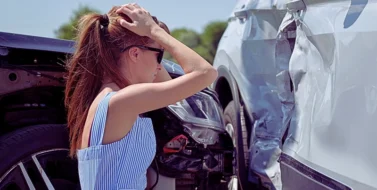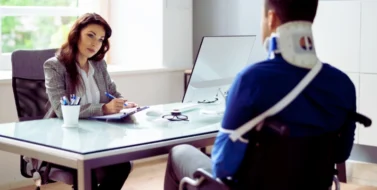After a car accident, there is a chance an insurance company asks for a recorded statement. While it might seem harmless, this statement is legally binding and could be used against you. It’s essential to consult an attorney before filing a claim to protect your rights and maximize your compensation.

Contact Lloyd Miller Law Group at (773) 838-8100 if the insurance company asks you for a recorded statement.
Table of Contents
What Is a Recorded Statement?
An insurance adjuster may request a recorded statement, which is your audio or digital account of the accident. They will ask about the incident, your injuries, and the damages to assess fault and compensation. Your statement will be transcribed and added to your claim file. It primarily benefits the adjusters as part of the car insurance claims process by allowing them to gather information quickly.
Why Would the Insurance Company Ask for a Recorded Statement After an Accident?
Insurance companies often ask for recorded statements from policyholders during the claims process. This practice allows them to gather information quickly, as an oral account is much faster than a written one. However, recorded statements can introduce errors that insurers might exploit to downplay claims.
Insurance adjusters use these statements to assess liability, identify inconsistencies, and evaluate the credibility of the claimant. It’s crucial to be cautious when providing a recorded statement, as it could harm your claim without legal advice.
Risks of Giving a Recorded Statement Without Legal Guidance
Giving a recorded statement without legal guidance can be risky, as anything you say might be used against you in court. Here are some dangers to consider:
- Inconsistencies: If you say something inaccurate or that contradicts other evidence, it could negatively impact your chances of getting compensation for your injuries. Insurance adjusters might frame their questions in a misleading or confusing way, so it’s important to be careful with your responses.
- Admissions of fault: During a recorded statement, you might inadvertently say something that could be interpreted as an admission of fault. This could jeopardize your ability to receive compensation for your injuries.
- Misinterpretation: Insurance adjusters may misinterpret or misrepresent your words in a recorded statement. This could lead to the denial of your claim or a reduction in the compensation offered.
- Limited knowledge: Recorded statements often take place shortly after the accident, when you could still be in shock or lacking full details about what occurred. This may lead to incomplete or incorrect information getting shared, which can hurt your case.
- Future injury assessment: With car accidents, injuries may worsen over time. Adjusters might question the extent of your injuries based on what you disclosed in a recorded statement.
Do car accident cases go to court? Some do, depending on circumstances, but most are settled. Insurance companies prioritize their profits. One of the top reasons companies lowball insurance settlement offers is their focus on minimizing payouts to protect their bottom line. Recorded statements may also be used as insurance company tactics to gather information that can help them minimize your compensation.
How to Respond if the Insurance Company Asks for a Recorded Statement
In Illinois, there is no legal requirement for you to give a recorded statement to the other party’s insurance company. Doing so without legal advice could hurt your case. However, if your own insurance company policy demands that you cooperate, you might be required to give a statement. In any situation, it’s wise to speak with an attorney beforehand.
Alternatives to Providing a Recorded Statement
If you feel uneasy about giving a recorded statement to your insurance provider, there are other options you can consider:
Submit a Written Statement
Rather than giving a recorded statement, you have the option to send a written statement to your insurance provider. This enables you to reflect on your responses, ensuring a more thorough and precise description of the incident.
Speak to an Attorney
Prior to giving a recorded statement to your insurance provider, it’s wise to consult with a car accident lawyer. They can advise you on the appropriate things to say and what to avoid, helping to safeguard your rights.
Ask Your Lawyer to Communicate with the Insurance Adjuster for You
Your lawyer can communicate with the insurance adjuster for you. This approach can safeguard your rights and ensure that the insurance company doesn’t exploit the situation.
Give Your Recorded Statement at a Different Time
If you’re not prepared to give a recorded statement right after the accident, you can request to do it later. This allows you to organize your thoughts and seek legal guidance before making any statements.
When to Contact a Personal Injury Lawyer
It’s wise to consult a lawyer before talking to insurance adjusters after an accident. Collision claims are the most common type of insurance claims, averaging 5.8 claims per 100 years of vehicle coverage, so you may need to file one at some stage. A lawyer can help protect your claim by guiding you on what to say and ensuring you don’t provide damaging information. They can assist in crafting a statement that focuses on the essential facts while filtering out unnecessary details.
You have the right to refuse to share information that isn’t relevant to your claim, and your attorney can help you avoid sharing anything that could be used against you. Writing down your statement allows for revisions, ensuring it accurately reflects your experience. Given that insurance adjusters are trained to minimize payouts, having a lawyer represent you levels the playing field.
Once a recorded statement is made, it can’t be altered, making it crucial to get it right the first time. A lawyer can also help gather medical records and evidence for your claim and manage communication with the insurer if disputes arise. Legal assistance can improve your chances of maximizing compensation. Contact us for support in protecting your rights and ensuring a fair process.





